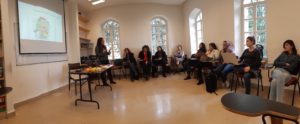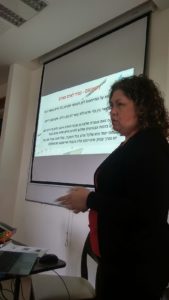For the past three years, we have organized a semi-annual meeting of Healthcare Cultural Competency Coordinators. Most of the Coordinators are from Jerusalem, but the meeting is open to Coordinators from throughout the country. This meeting was held on December 4, 2019 at the JICC’s offices on Mount Zion.
This meeting focused on two subjects: our own Living Safer, Living Longer project, and the experience of the Haifa-based Bnei Zion Hospital in assimilating principles of cultural competence in the hospital.
Aliza Shabo-Hayut, director of the Living Safer, Living Longer project, gave a short introduction and explained the connection to cultural competency. She explained that it was imperative that the project be culturally competent for it to succeed, since it teaches home safety and preventive health to the elderly and young families through awareness-raising and individual mentoring by volunteers, and the ways to achieve this are laden with culturally sensitive issues in different populations, especially in the Haredi and Arab sectors. Currently, the project operates only in Jerusalem, but the model can be copied and replicated throughout the country.
Making the project fully culturally competent was not an easy task, it essentially meant needing to create and develop 3 different projects – one for the ‘general’ Jewish population, one for the Haredi population, and one for the Arab population. Content (from flyers and posters to explanatory materials for lectures and mentoring sessions) and training methods were specifically tailored for each group (appropriate for Haredi, Arab as well as ‘general’ Jewish beneficiaries), as were training aides, explanatory materials. Volunteers needed to be recruited and trained in each group as well. Checklists of what the volunteers were looking for in the homes were also adapted to both the age (elderly vs. young families) and group with which they were associated. For example, chains to secure hot water urns (used on Shabbat and often the cause of burns among Haredi children) are distributed in Haredi families, whereas there is no need for this in other groups.
We also welcomed special guests from the Bnei Zion hospital in Haifa, who shared their experience of assimilating cultural competence in the hospital. Orly Altman, a general nurse and the Cultural Competency Coordinator at Bnei Zion, and Ragda Halabi, a midwife at the hospital, told how the project began and gave a short lecture.
Orly said that the first step was to establish a steering committee for cultural competency that consisted of representatives from a variety of communities, with a goal to train agents of change to promote cultural competency that promotes mutual respect and human dignity. The committee created a document with important information about each community, including the rules of “do’s and don’ts,” and each member of the committee built a training session about the community to which he or she belongs, and chose how to present it.
Ragda, a member of the Druze community, introduced us to the principles of the Druze religion: the life cycle and different rituals, the status of women, visitng the sick, escorting Druze religious women for medical exams and more.
The meeting was fascinating and the participants learned more about Druze culture and religion and their connections to health.
Thanks to Michal Schuster for organizing the meetings. And of course, many thanks to the Jerusalem Foundation, for its continued support of Cultural Competency over the past decade.



